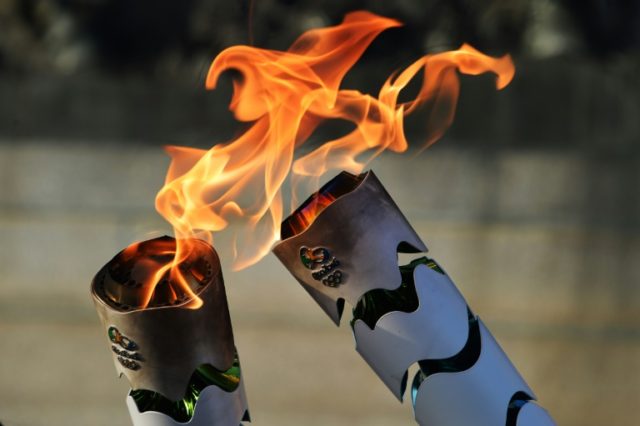Protesters, including teachers on strike, stole and extinguished the Olympic torch in Rio de Janeiro Wednesday, raising security concerns about potential disruptions when the Summer Olympic Games begin in Brazil on August 5.
The protesters disrupted the Olympic torch relay carrying the symbolic item into the city of Rio in Angra dos Reis, a municipality in Rio de Janeiro state. To steal the torch from official Olympic runners, the protesters threw stones and bricks at police and physically attacked those participating in the event.
According to the Brazilian outlet O Globo, the protesters demanded that an emergency response unit shut down due to lack of funds be reopened, as well as their own salaries as government employees. Rio de Janeiro state has been struggling to pay its workers for months. O Globo notes that at least one person, a child, was hospitalized following the protest. Military police halted the attack with tear gas and rubber bullets.
The Washington Post notes that this is the latest in “a series of attempts to either steal or extinguish the Olympic torch, with fire extinguishers and buckets of water. Other times, the torch bearers have simply foiled themselves by slipping or tripping.”
Video indicates this was the most successful effort yet, as the torch can be seen not carrying a flame.
Rio Security Secretary Jose Mariano Beltrame told media following the event that Olympics officials will be overhauling security around the event, and asserted that, “in his opinion,” “extinguishing the torch is a crime.”
Recent polls found that half of Brazilian citizens oppose their country hosting the Olympics, the pet project of now-impeached leftist president Dilma Rousseff. Funding the Olympics has left the state of Rio de Janeiro with insufficient funds to pay for necessary public services, like police, teachers, and hospitals. In mid-June, Rio governor Francisco Dornelles declared a state of emergency, demanding $900 million to pay police and doctors working at public hospitals. Funding the Olympics at the expense of necessary public functions, he warned, could lead to “a total breakdown in public security, health, education, mobility and environmental management.”
Police, deprived of salaries for weeks, have been reduced to asking locals to donate toilet paper and stationary to their local stations. Police protesters have appeared in front of Rio’s city hall and at its international airports warning tourists of the situation with signs reading “Welcome to Hell – police and firefighters don’t get paid.”
Amid the lack of funds to pay police, reports have surfaced of police resorting to robbery. This week, New Zealander and jiu-jitsu champion Jason Lee was kidnapped at gunpoint and forced to withdraw hundreds of dollars from his ATM by men wearing Military Police uniforms.
Rio de Janeiro Mayor Eduardo Paes has lamented the nation’s opposition to the Olympics. “I understand the issue of public opinion, especially for those who are not in Rio because the legacy is a lot for the city of Rio,” he said in an interview with Folda de Sao Paulo. “They only see bad news… We are going through a very bad time in Brazil, politically and economically. In the case of Angra, there were civil servants who do have received their salaries from the city. There is a protest against the Olympics.”
“It would be ideal for Brazil’s moment to host the Olympics to be another,” he admitted, adding that he expects copious booing at the Olympics opening ceremonies because it is an “ugly culture” practice common in Brazilian life.

COMMENTS
Please let us know if you're having issues with commenting.